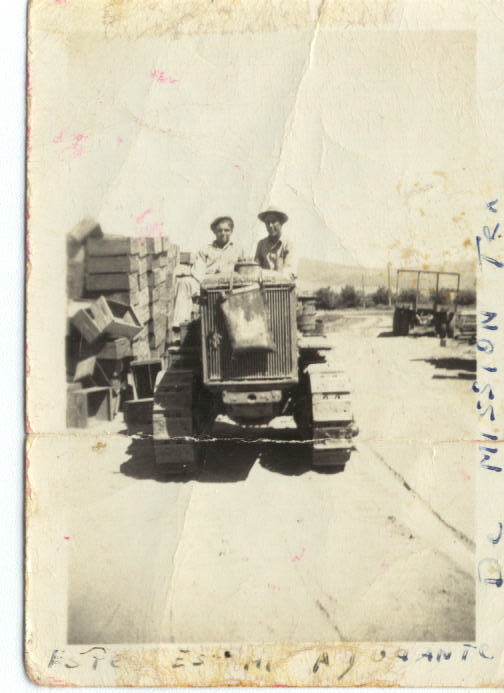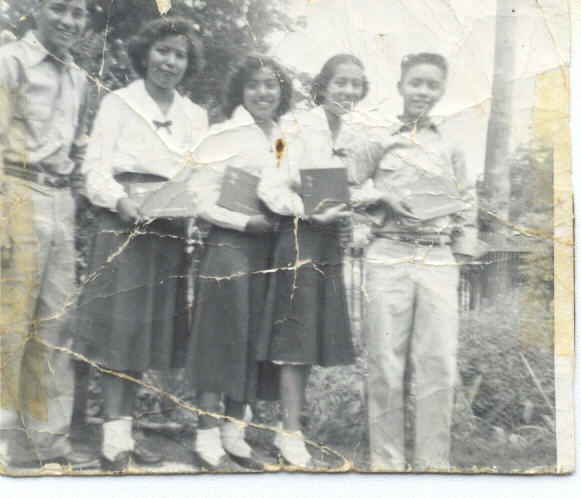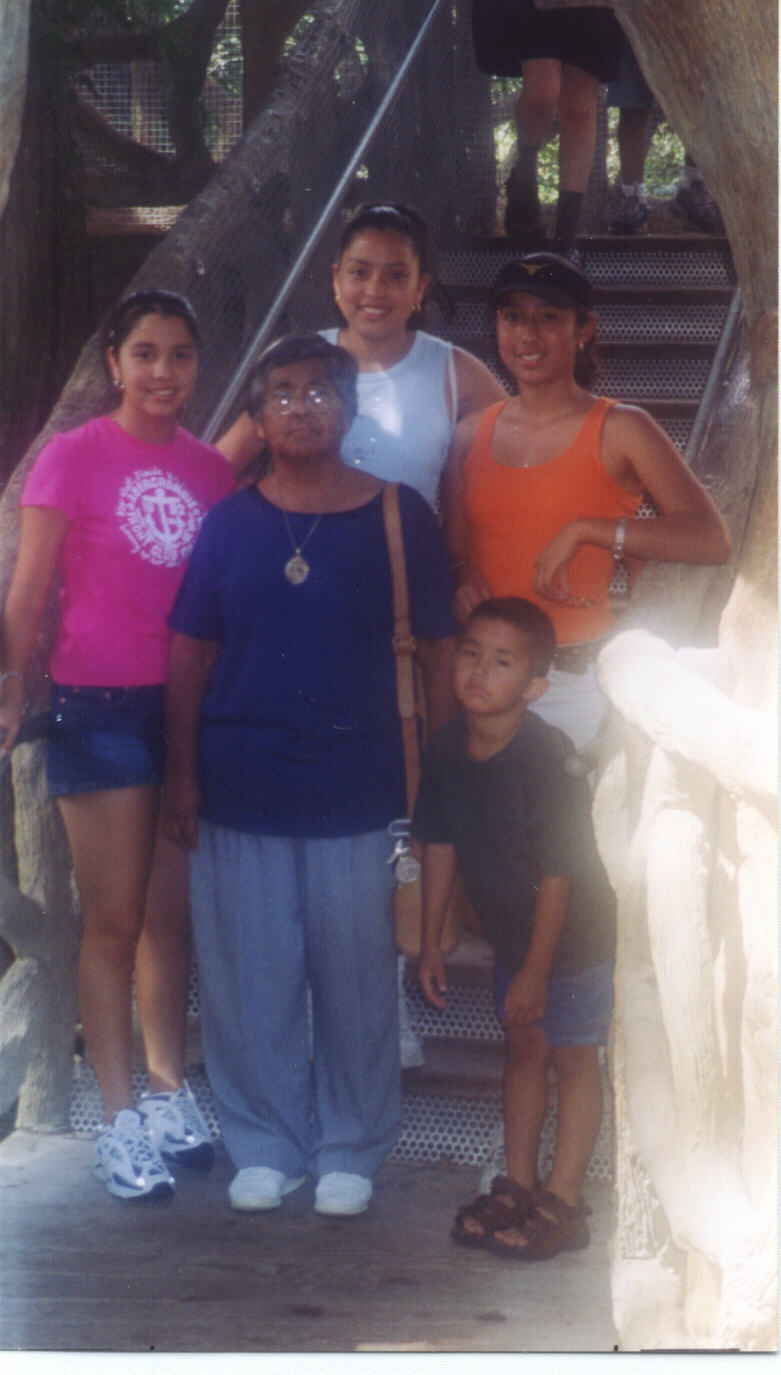INTRODUCTION
Anita Vasquez Garcia was born in San Antonio, Texas in the home of her parents Benito and Anita Vasquez, on February 7, 1939. She has three sisters and is the oldest of the four. She attended and completed elementary and junior high school. However, when she began as a freshman at Poe High School she realized she was not going to be able to complete this level of education at the moment due to her mother's illness. Being the oldest child the responsibility of caring for her mother was left upon her. After she left the ninth grade the first time she attempted it again, but again was unsuccessful.
In 1959 Anita Vasquez was married to Armando Garcia here in San Antonio by civil court. Then in 1960 they were again married by church. In 1960 Anita Garcia was also blessed with her first child, Armando Garcia Junior. Then in 1964 she had her second child, a son named Mario Garcia. For the first five years of her marriage she, her husband, and her children lived in San Antonio but in 1964 when her husband, who was in the military, was stationed in France she and her young boys moved to Bitry le Francois with him. In 1965 while living on base in France she had her third child, Mariannette Garcia. Then in 1966 when she and her family moved back to San Antonio she had her fourth child, a son named Guadalupe Garcia.
She divorced her husband in 1967 a year after their fourth child's birth. Now with four children to care for she decided to go back to school to help begin in providing for her family. She had two other children after her divorce both boys. David Martin Garcia born in 1968 and Joseph Benedict Garcia born in 1975.
She received her GED in 1978 and went on to attend San Antonio College. She went to college for about three years, just long enough to get hours to meet the job requirements for teaching and management. She had been working with children since the age of eight, and had six of her own children, therefore this came more than natural to her.
After college she began work as a teacher's assistant. She did this for three years, then went on to become a teacher, which she did for one year. After that one year as a teacher she became an education coordinator, which she did for 16 years. She retired in 1997, but is still involved with children, being that she is now a grandmother of ten. Today my grandmother is 63 years old and enjoys the company of her dog, Tiny, at home while she makes and sells her ceramics.
TRANSCRIPTION
Why did you move to California?
They (mom and dad) married here, they couldn't make a go of it. So what he did, when we were little he left for California where his brother was, my uncle was a foreman for migrant workers. So they gave my dad a job there. That's when we all moved over there cause my uncle gave my dad a job.
What did grandpa use to do?
He worked as a migrant worker . They use to call them braceros in Spanish. Bracero is a migrant. He used to work in the fields. I used to work in the fields too, with my dad.

What did you used to do?
We use to work with the carrots, the onions, and we used to go pick up pecans and cherries. We used to get up on the ladder. We had to climb the ladder to pull the cherries down, and I was young. I wasn't old, I was young, I was a little girl. And we used to work the tomatoes. We sometimes use to eat the tomatoes. Sometimes I was afraid to work in the tomatoes because you could come across a snake.
Did your sisters help too?
No, just me. Rita never liked to do anything and Lupe was too young.
Where did you live when you were in California?
We use to live on the farms. A small little place not very big, but we had to go to the toilet outside. It was like courts and there was a little area where you could play. I used to play there with my bicycle all the time. It was the only bicycle I ever got and that's it. I learned to ride it until I fell down.
Was the toilet far from the house?
It was like from here to next door. Sometimes they were a little further depending. We didn't have no inside toilet. In the middle of the night if you had to go to the bathroom, outside. And I was scared to death.
Did you have any plumbing, like water?
We had water, but we didn't have a toilet inside. We didn't have no tub either. We took baths in those big buckets. Not the small ones the huge ones, they're round.
Was the water changed out after every bath?
No, sometimes we had to use the same water. Cause I remember when I would get in there it was kind of funny, but I had no choice.
Did you go to private school in California?
Yes, I went to Sacred Heart . That's where I made my communion. Then we moved to San Antonio.
What did you wear in school?
In the regular schools they were all long skirts, when I was in private school it was long skirts too. Some of the girls got away with it.

When did you move over here, how old were you?
I don't know but I remember that when we came from over there, over here. When we left California it was freezing cold, when we got here to San Antonio is was hot! Cause my mom had one of those big fur coats and when we got here she didn't wear it after that cause it was too hot. I don't remember if I had a coat.
Why did you move back to San Antonio?
They told my dad that if he didn't bring my mother back her she wasn't going to make it. So we got the money and flew over here.
Why did she have to come back, was there a hospital here for her?
No, they said they had to bring her back home because she was I think depressed.
Where else did you live?
I was living in Galveston at the time. I was I think 14 years old. I was living with my aunt. I didn't go to school, I went to work. I never finished school. I couldn't find a job here, then I came back and I still couldn't find a job.
Where did you work when you were younger?
It was a place where you buy malts and ice cream and banana splits and taquitos like Dairy Queen. It was a soda jerk and there were no black people that could go in there. They were all white, there were a few G.I.'s that would go in there for a soda water or something and you had to ask them what nationality they were.
Were there any black people working there?
Just us three Mexicans, four Mexicans.
Do you remember the racism back then?
We hardly saw any black people. I remember the black people when I use to be here in San Antonio because I had to take the bus to go to work or whatever. I was already 17 or 18, before I got married. My cousin and I used to walk, cause we never had the money for the bus, but when I used to take the bus I didn't know if I was supposed to sit in the front, or the back, or the middle. The white people were in the front, the black people were in the back, and I didn't know where I fell in. So I would try to find a seat in the middle.
Were you ever told anything on the bus?
They just looked at me until I sat down. Even the bus driver kept looking through the window until I found a seat. One time I sat in the front. Everybody looked at me, but I was a little girl so I didn't know. They just kept looking and looking. I felt very uncomfortable so I rang the bell and I got off, I walked.
Did anyone ever tell you things?
When I was little, they used to tell me if I was Indian and I said no! I'm a Mexican. Then why is your skin red? I said I don't know why my skin is red but I'm not an Indian, I'm a Mexican. My skin looked kind of reddish-brown because I used to be in the sun a lot because I used to work outside. Even when I was in France overseas with your grandpa they thought I was French they didn't think I was... because the French people have different color skin, some of them were white and some of them are not. I don't know why but I would say I'm not French I'm American. I had to get my I.D. out to prove who I was.
When you were in your teens or after you got married did they still have separation laws?
Yeah, they did but when I was a teen it didn't faze me too much because your grandfather was in the service and there was a lot of black people in the service. So it didn't bother me, but it's because I was Hispanic, but it bothered the white people.
ANALYSIS
I often hear people say that back then were the good old days. Doing this interview with my grandmother I have learned that that isn't true for everyone. My grandmother never complains about the past, because that is just how things were for her and her family. Although, if things would have been better she might not appreciate everything today.
The most interesting thing I learned about my grandmother, even though I chose not to include it in my presentation, was that she met one of her sisters when she was 11 years old. It might not seem like much, but it strikes me as odd because if you knew how close they are now you would never guess that they hadn't known each other their entire lives, like most brothers and sisters.
I now look upon the topic of the interview not as a tedious school project, but more of a firsthand learning experience,
which can prove as a benefit of the interview process. A drawback of course would be that my grandmother does not remember everything perfectly, so like information out there today some may be incorrect.
Overall though, this is an
effective way about learning about the past. Although some information may vary according to different interviews, some may also be so unique that no matter what text you read it won't be found. That is the good part of an interview, the things they tell you may have never been something you were taught and you might have never known about it if it were not for them sharing their experiences.
ANNOTATED BIBLIOGRAPHY
Picture History Workers. http://www.picturehistory.com/find/c/250/start/60/startpage/0/mcms(2003).
This site gives a photographic history of migrant workers, among other things. A brief view of how people lived and worked in California in the 1940's.
MacnStuffout house memories. http://www.macnstuff.com/mcfl/1/outhouse.html(December 31, 1997)
For those who have never seen an outhouse or are not familiar with one this is a glimpse of what they were like. Some do still exist but are most likely in use.
Sacred Heart Parish School http://www.sacredheartschool.org
This is the school my grandmother went to. It may or may not have looked this way when she went here, but one thing is for certain it is an old school.
Official City of Galveston For Visitors. http://www.cityofgalveston.org/visitors/(2002)
Here is some information and history about the city of Galveston.
Return to Oral History Projects

